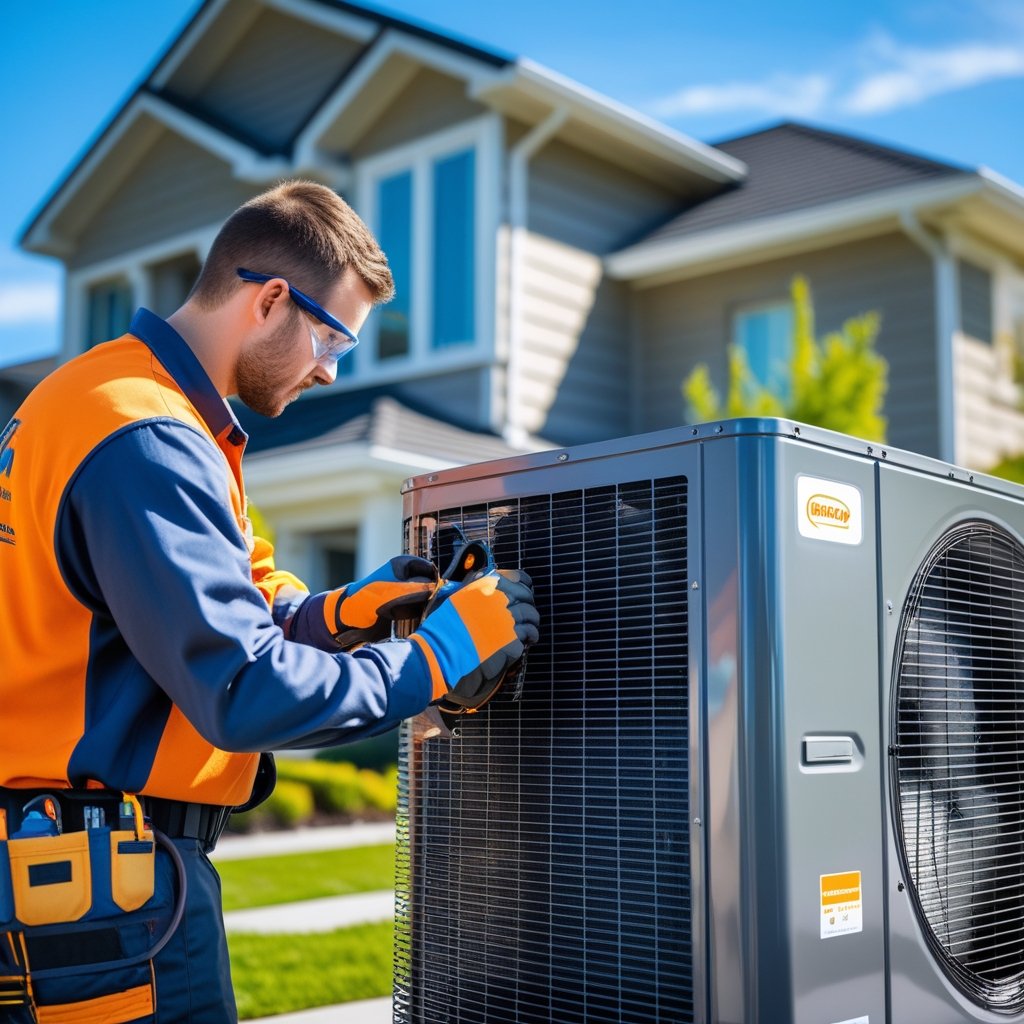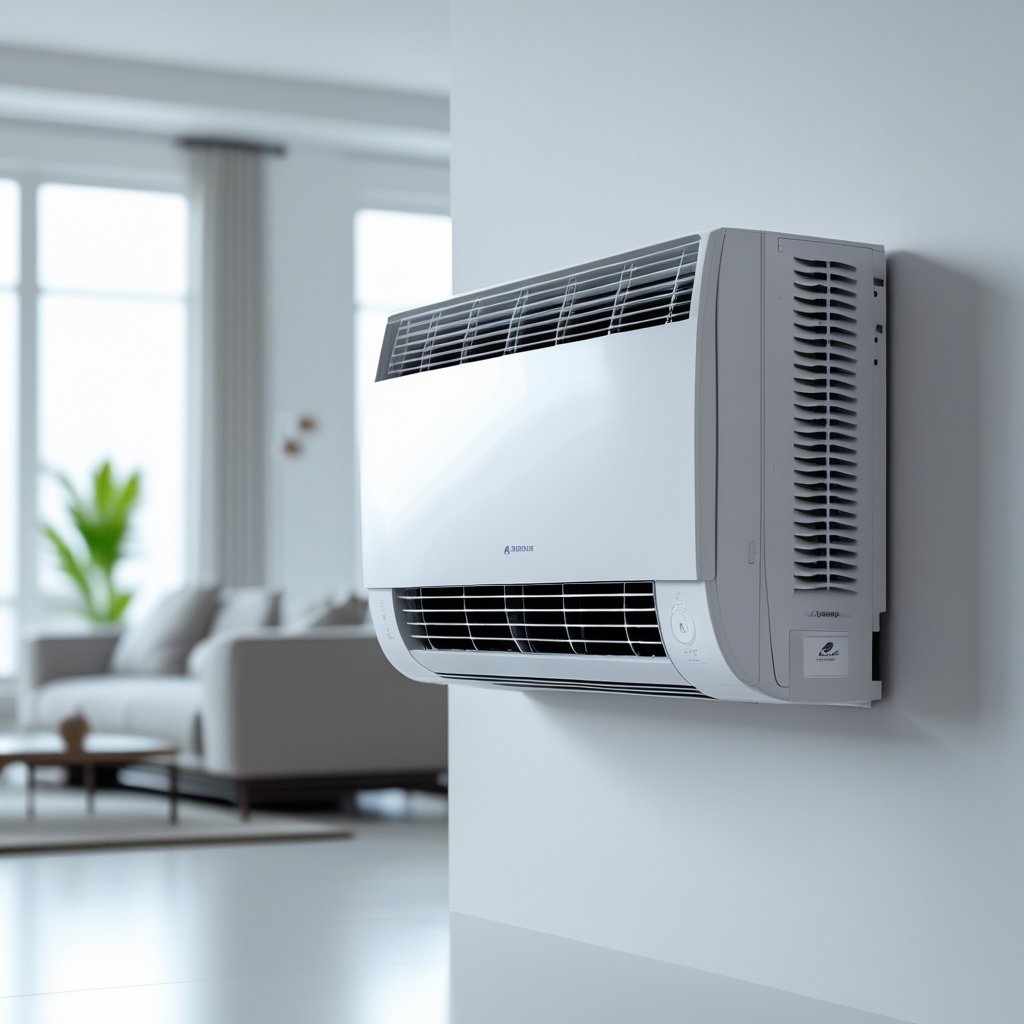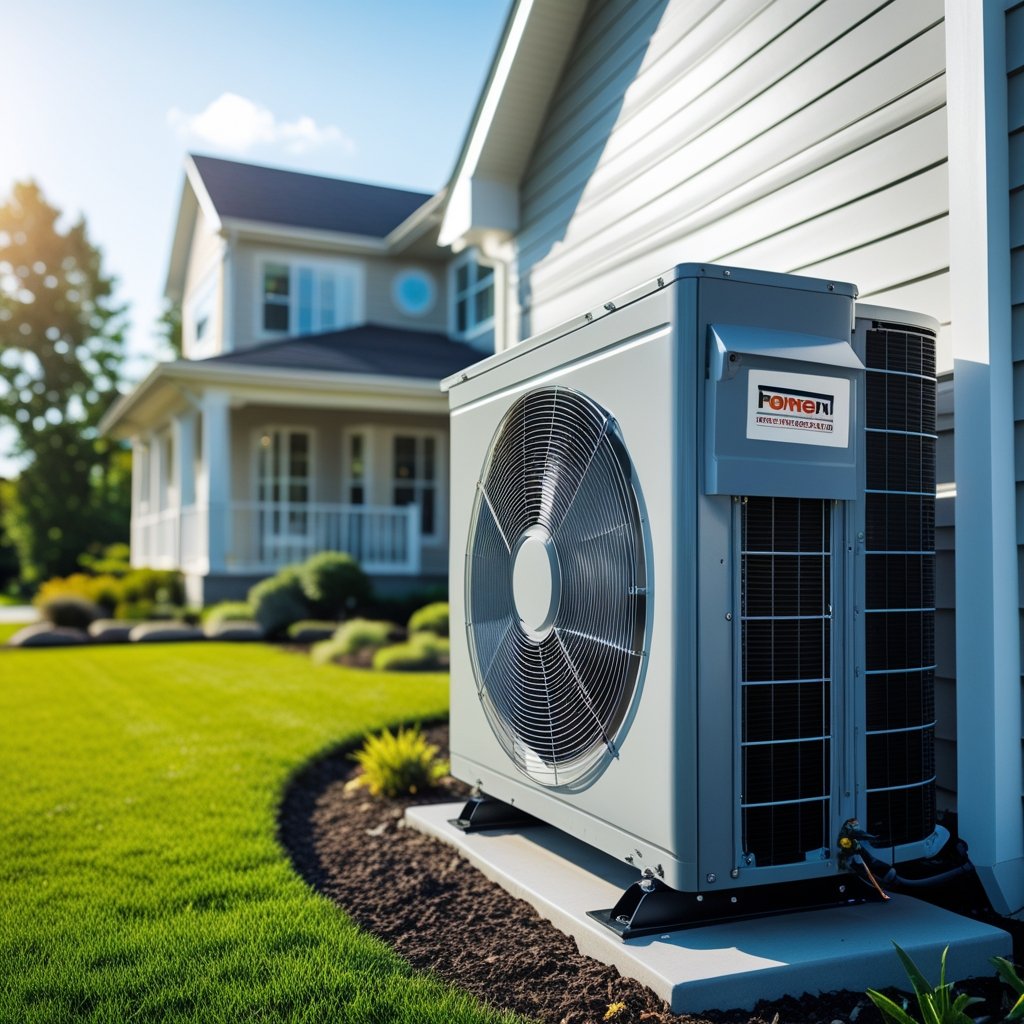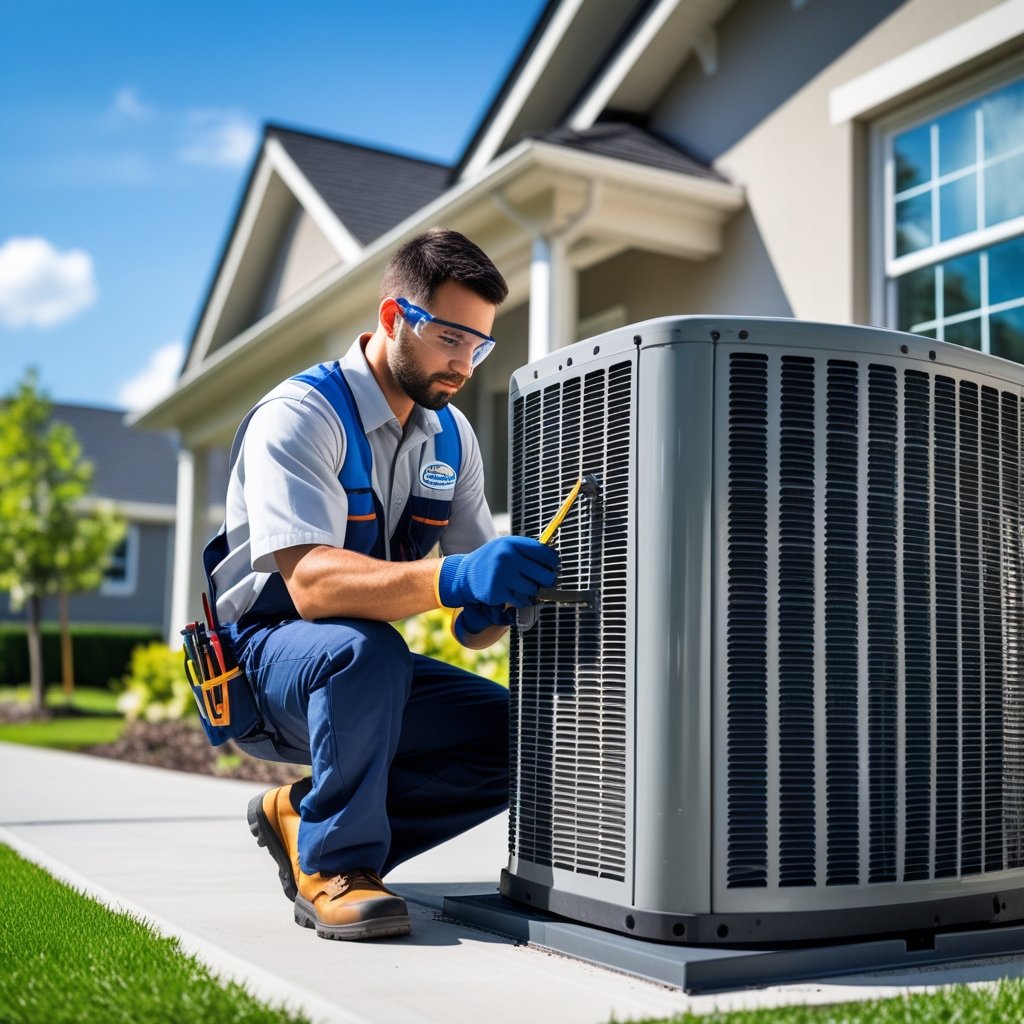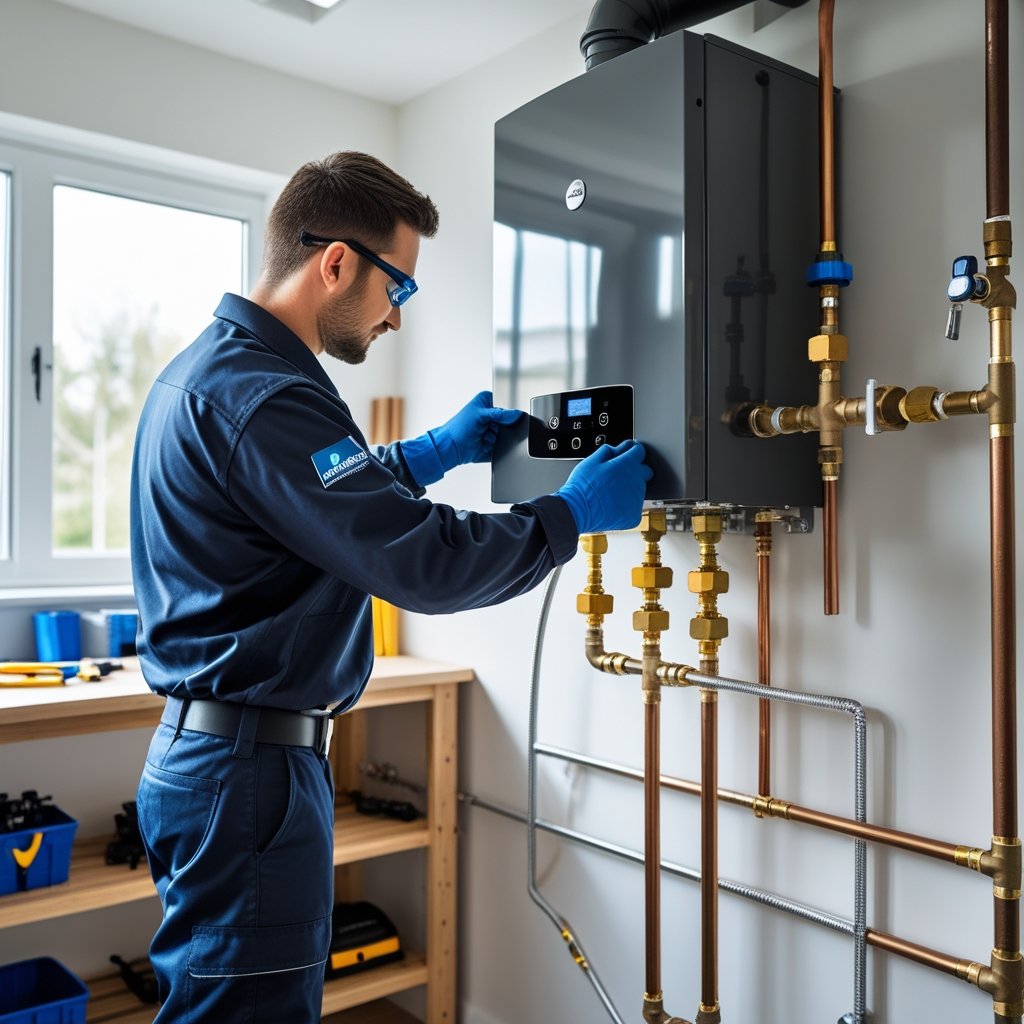Thinking about adding a heat pump to your home? Finding the right contractor makes all the difference. A qualified heat pump installation contractor will make sure your system is efficient, reliable, and just right for your space. That means you’ll save money on energy and stay comfortable no matter the season.
Going with a local team like Leo Kob Co.—they’ve been around South Central Pennsylvania for over a hundred years—gets you honest service and no sneaky fees. Whether you’re in Elizabethtown, Lancaster, or York, you’ll have pros handling everything from mini-split installs to system maintenance with real care.
It helps to have a crew that listens, explains your options in plain language, and treats your home with respect. Contractors who focus on quality and your peace of mind make sure your heat pump’s dialed in for the long haul.
What Is a Heat Pump and How Does It Work?
A heat pump basically moves heat from one place to another. It’ll warm your house in winter and cool it in summer by transferring heat instead of making it from scratch. Knowing the different types, the benefits, and where these systems actually work best can help you figure out if a heat pump’s right for you.
Types of Heat Pumps
You’ll usually run into three main types of heat pumps:
- Air-source heat pumps: These pull heat from the outside air to warm your place. In summer, they reverse and keep things cool.
- Ground-source (geothermal) heat pumps: They use steady underground temps for heating and cooling. Super efficient, but the upfront install cost is higher.
- Water-source heat pumps: If you’ve got access to a well or pond, these grab heat from water sources.
Each type has its quirks and works better in certain spots. Around Elizabethtown or Lancaster County, air-source heat pumps are usually the most practical—and budget-friendly—pick.
Benefits of Heat Pumps
Heat pumps use a lot less electricity than old-school furnaces or ACs, so you’ll see those energy bills drop. Plus, you’re doing the planet a favor by cutting carbon emissions.
There are rebate programs in South Central Pennsylvania, sometimes with credits that help cover installation. That means you could save money right from the start.
Since heat pumps handle both heating and cooling, you’ve got fewer gadgets to worry about. Leo Kob Co. installs and maintains heat pumps with a focus on real quality and straightforward pricing.
Common Applications
Heat pumps work great for homes and small businesses that need year-round comfort. They’re a solid fit in places like York and Hershey, where winters aren’t too harsh.
A lot of folks use mini-split heat pumps for single rooms or additions without ducts. Others go for a full system to replace their old HVAC.
They’re efficient and reliable, so it’s not surprising more people want that energy savings and comfort. Regular maintenance from a nearby contractor keeps your system humming along for years.
Choosing the Right Heat Pump Installation Contractors
Picking the right contractor really does matter for how well your heat pump works and how long it lasts. You’ll want to check their experience, make sure they’re licensed, and see if they know your area. These are the things that help you dodge headaches and get quality service.
Qualifications to Look For
Look for a contractor who really gets heat pump systems. Experience with different models—mini-splits, standard heat pumps, all that—matters. Skilled techs know how to size and install units so they actually fit your home.
A good installer explains your options without confusing jargon or upselling stuff you don’t need. Ask if they handle both installation and maintenance. That’ll make future repairs and tune-ups a lot simpler.
At Leo Kob Co., the techs are trained to do solid work at a fair price. They put customer care first and want your investment to last. That kind of reliability? It’s worth something.
Certifications and Licensing
Always check that your contractor’s licensed to work in your area. Licensing means they meet state standards and follow safety rules.
Certifications from groups like NATE (North American Technician Excellence) show the techs know their stuff when it comes to heat pumps. These credentials cut down on risks and help your system run better.
Ask about insurance, too. It’s there to protect you if something goes sideways during the job. Leo Kob Co. is licensed and insured for South Central Pennsylvania, including Elizabethtown, Lancaster, and York.
Local Experience
Pick a contractor who actually knows South Central Pennsylvania’s climate and building quirks. Local know-how means they get the challenges—humidity, temperature swings, energy costs.
A company that’s been around Hershey, Mount Joy, or Lancaster will know which brands and models hold up best. They can also help you tap into local energy rebates or incentives.
Working with someone who’s part of your community usually means quicker service and a better fit for your home. Plus, it shows they care about building lasting relationships nearby.
The Heat Pump Installation Process
Choosing a heat pump involves a few key steps to make sure it fits your home and works efficiently. It starts with a good conversation and ends with a system that’s sized and selected for you.
Initial Consultation
First up, you’ll meet with your contractor to talk about your heating and cooling needs. You’ll go over how your home’s set up now, what you want, and what you’re looking to spend.
This is your chance to ask about system options, warranties, and what it’ll cost. The contractor should explain how a heat pump could save energy and maybe even qualify for rebates, especially around South Central Pennsylvania.
At Leo Kob Co., they’re big on clear answers and no-pressure advice. The idea is to help you feel good about your choice before moving forward.
Home Assessment
Next, a tech comes out to check your place. They’ll look at insulation, windows, and your current heating system to see how your home holds temperature.
They’ll also check out space for indoor and outdoor units and make sure your electrical panel can handle the new setup. This step helps spot any upgrades you might need ahead of time.
The tech will note your home’s layout and typical energy use, so the new heat pump keeps you comfy year-round.
System Sizing
Getting the size right is crucial. If the system’s too small, it’ll struggle; too big, and you’re wasting energy (and money).
Using info from the home assessment, your contractor figures out the heat load for your house. They’ll factor in square footage, ceiling height, and local weather around Lancaster County, York, and nearby spots.
This helps pick a model that runs efficiently and keeps your bills down. At Leo Kob Co., they take this part seriously to make sure your investment pays off.
Pricing and Cost Factors
When you’re hiring a heat pump contractor, there’s more to think about than just the upfront price. Consider ongoing costs, and don’t forget about rebates or incentives that could trim your expenses.
Installation Costs
How much you’ll pay depends on the size and type of heat pump you pick. In Lancaster County or Elizabethtown, a typical setup runs from $4,000 to $8,000 for a standard system.
What bumps up the price:
- System size and how efficient it is
- How tricky your ductwork or mini-split install will be
- Labor and time needed
- Electrical upgrades, like new panels or wiring
Leo Kob Co. keeps pricing transparent—no hidden fees, no surprises. You’ll know what you’re paying for before they start.
Operating Expenses
Once you’ve got your heat pump, most of your costs show up on your electric bill. Heat pumps use electricity to move heat, but they’re way more efficient than old heating or cooling systems.
In South Central Pennsylvania, your costs will depend on:
- Local electricity rates
- How well your place is insulated
- How wild the weather gets each season
Regular maintenance from folks like Leo Kob Co. keeps your system efficient and your bills lower. Think of yearly tune-ups as insurance for your investment.
Potential Rebates and Incentives
You might qualify for rebates or tax credits that cut your upfront costs. These perks are there to encourage upgrades to energy-efficient systems like heat pumps.
Check with:
- Local government programs in York, Hershey, Mount Joy, or Lancaster County
- Utility companies offering rebates for electric heating or cooling
- Federal tax incentives for energy-efficient home improvements
Contractors often help with the paperwork or point you to the right programs. Using these incentives can knock hundreds or even thousands off your total bill.
Evaluating Contractor Reviews and Testimonials
When you’re picking a heat pump contractor, reviews and testimonials can show you what kind of work they really do. Honest feedback about quality, reliability, and professionalism goes a long way. Both online ratings and direct references can give you a better idea of what to expect.
Online Ratings
Check out reviews on Google, Angie’s List, and similar sites. Don’t just look at the star rating—read the comments. Notice what people say about punctuality, cleanup, and how well the company communicates.
Be wary if every review is glowing—sometimes that’s a little too good to be true. Focus on feedback from homeowners in South Central Pennsylvania, like Elizabethtown or Lancaster County. Reviews that mention specific jobs, like “mini-split installation” or “heat pump repair,” are especially helpful.
Leo Kob Co. earns strong ratings for honest pricing and quality work. Customers often mention reliability and respect.
References from Past Clients
Ask contractors if you can talk to past clients. It’s a good way to get the real story.
Some questions to ask:
- Did they finish on time?
- Was the pricing straightforward?
- Did the installer explain maintenance?
- Has the system held up through the seasons?
Hearing from folks near Mount Joy or York who’ve used the service can boost your confidence. Good contractors are happy to share references.
Checking references is a simple step that helps you avoid surprises and get the service you expect.
Maintenance and Support After Installation
After your heat pump’s installed, taking care of it keeps things running smoothly and helps you avoid big repair bills. Make sure you know what’s covered under warranty and what service plans are available. And if something goes wrong, getting help quickly saves a lot of hassle.
Warranties Provided
Most new heat pumps come with a warranty on parts and labor for a certain period. This covers you if something fails due to a defect or installation error. Leo Kob Co. offers warranties that meet—or beat—industry standards.
Hang onto your warranty info and know what’s included. Some require regular maintenance by licensed pros to stay valid. If your heat pump has issues during the warranty, just call your installer for repair or replacement—no extra charge.
Service Agreements
Service agreements give you scheduled maintenance and priority repairs. These plans help catch little problems before they turn into big ones, saving you money over time. They often throw in discounts on parts, labor, and regular checkups.
A typical plan covers:
- Annual tune-ups for heating and cooling
- Cleaning filters and coils
- Checking refrigerant
- Testing electrical connections
Having a plan means less worry and faster service, especially when everyone else is calling for help. Leo Kob Co. offers service agreements for homes in Elizabethtown, Lancaster County, and nearby areas, so your heat pump stays efficient all year.
Troubleshooting Common Issues
A lot of heat pump problems are easy to spot early if you know what to look for. If your unit isn’t heating or cooling well, check for blocked airflow or a wonky thermostat.
Some common issues:
- Ice on the outdoor unit
- Odd noises from the compressor
- Cycling on and off too often
- Water around the system
If you notice any of these, shut off the unit and call a pro. Trying to fix it yourself can make things worse or void your warranty. A licensed tech from South Central Pennsylvania can check it out and get you back up and running.
Upgrading Existing Systems with Heat Pumps
Switching to a heat pump can make your home more comfortable and save on energy. It usually fits in with lots of heating setups, though you’ll want to plan so everything matches up. Adding smart controls can help you manage energy use and keep things running smoothly, too.
Retrofitting Considerations
Thinking about upgrading to a heat pump? Start by taking a look at your current system. If you’ve got old ductwork or outdated heating equipment, you might need to tweak or replace a few things so everything works smoothly together. A good contractor will check airflow, insulation, and whether your system’s the right size, helping you avoid energy waste or extra wear and tear.
If your place doesn’t have ducts, a ductless mini-split heat pump could be the way to go. They’re pretty straightforward to install and let you control the temperature in each room. Honestly, having experienced techs—like the folks at Leo Kob Co.—handle the install is worth it for efficiency and peace of mind.
Don’t forget to check for local rebates or incentives for upgrading your heating system. These can take some of the sting out of upfront costs, especially in places like Elizabethtown, Lancaster, or York.
Integration with Smart Home Technology
Pairing a heat pump with smart thermostats or controls lets you dial in your comfort level with just a few taps. You can save energy by setting up schedules or making quick adjustments from your phone, whether you’re home or away.
Smart systems keep tabs on how things are running and can flag issues before they turn into expensive repairs. That’s one less headache, honestly. Leo Kob Co. installs heat pumps with smart tech options, helping homes in South Central Pennsylvania stay efficient without a ton of hassle.
Most smart controls have simple interfaces—no tech degree required. These upgrades often pay for themselves over time by cutting utility bills and making your system a bit more reliable.
Environmental Impact of Heat Pump Installations
Heat pumps can make a real dent in your home’s energy use and environmental footprint. If you’re curious about how these systems boost efficiency and cut emissions, it’s worth looking at what they offer folks around Elizabethtown, Lancaster, and nearby towns.
Energy Efficiency
Heat pumps move heat instead of generating it, so they use less energy than old-school heating or cooling setups. That means you can stay comfortable all year and still use less electricity.
When professionals like Leo Kob Co. install modern heat pumps, they set them up to run efficiently—even during those cold snaps in York or Hershey. Mini-split systems, for example, give you targeted heating and cooling with very little wasted energy.
Lower power use means lower utility bills, plain and simple. Plenty of local customers can get state or utility rebates, too, which helps with installation costs. Keep up with maintenance and your system should keep saving energy for years.
Reducing Carbon Footprint
Switching to a heat pump means your home burns less oil or natural gas, so you put out fewer greenhouse gases. That matters if you care about your impact in Lancaster County or Mount Joy.
By using less fossil fuel energy, heat pumps help cut down carbon dioxide emissions from traditional heating. Fewer pollutants end up in the air you and your neighbors breathe.
A well-installed and maintained heat pump also fits the push for cleaner air and a healthier local environment. It’s a choice that lines up with sustainable living in South Central Pennsylvania.
When you go for a heat pump, here’s what usually happens:
- A pro checks what your home needs
- You get options that actually work for local weather
- You’ll see clear info on rebates and incentives
- There’s support and maintenance for keeping things running right
If you’re in Elizabethtown, Lancaster, York, or nearby, Leo Kob Co. offers straightforward installation and real transparency.
Finding Reliable Heat Pump Installation Contractors Near You
Looking for a heat pump contractor? It’s worth taking your time to check local options and compare what they offer. That way, you avoid overpaying and get solid work. Having a list of questions ready makes things less stressful.
Local Search Tips
Start by searching for contractors around Elizabethtown, Lancaster County, Mount Joy, York, or Hershey. Companies with deep local roots usually know the climate and building codes better.
Check reviews for honest pricing and respectful service. Family-run businesses like Leo Kob Co. often bring a level of care and transparency that’s hard to find with bigger outfits.
Here are a few questions to keep handy:
- How long have you installed heat pumps in this area?
- Which brands or models do you recommend?
- Do you offer maintenance plans or warranties?
Make sure they’re licensed and insured. A quick look at their track record with local customers can save you trouble later.
Comparing Multiple Quotes
Getting several detailed quotes helps you see what’s fair and what’s not. Ask each contractor to break out the cost of equipment, installation, permits, and any extras like ductwork or electrical work.
Lay out the quotes in a table to compare:
ContractorEquipment CostInstallation FeeWarranties OfferedMaintenance PlansTotal Estimate Contractor A$3,500$1,20010 years compressorYes$4,700Contractor B$3,300$1,4007 years compressorNo$4,700Leo Kob Co.$3,600$1,10010 years compressorYes$4,700
Don’t just chase the lowest number. Look at who stands behind their work with solid warranties and service. Good contractors explain their quotes and skip the hidden fees.
Ask about energy rebates or tax credits, too—installing a new heat pump can qualify you for savings, and trustworthy contractors usually help with the paperwork.
Frequently Asked Questions
Getting a heat pump installed means you’ll want the right contractor. Figuring out who’s reliable, what to look for, and what you’ll actually pay makes the whole thing less overwhelming. And hey, it’s smart to know why some contractors hesitate or how tax credits could help you save.
How do I find a reputable heat pump installation contractor near me?
Check for licensed, insured contractors with solid reviews in towns like Elizabethtown, Lancaster, or York. Ask for references or look up local listings to see if they’ve worked with heat pump systems before.
You can always reach out to companies like Leo Kob Co., who’ve been around South Central Pennsylvania since 1904.
What should I consider when choosing a contractor for residential heat pump installation?
Pick someone who really knows HVAC, especially heat pumps. Make sure their pricing is clear—no hidden fees.
It’s also helpful if they offer maintenance or repair services, not just installation, so your system stays in good shape.
What are some characteristics of the best heat pump installation contractors?
The best contractors are skilled, communicate clearly, and explain things in plain English. They should have the right licenses and insurance.
Look for a company that values honest work, stands by their service, and focuses on energy efficiency and long-term savings.
How can I estimate the average labor cost for a heat pump installation?
Labor costs depend on where you live and your system’s size, but usually include installation and any needed electrical work. You’ll probably see starting prices around $1,800 for basic installs, but it can go up if things get complicated.
Always get a detailed quote that breaks down parts, labor, and permits before work kicks off.
Why might some contractors be hesitant to install heat pumps?
Some contractors just don’t have the right training or experience with heat pumps. Plus, the technology keeps changing, so staying current can be tough.
Others might hesitate because of the upfront costs or the challenge of fitting heat pumps into existing systems.
Are there any available federal tax credits for installing a heat pump?
Yeah, you can usually get federal tax credits for putting in an energy-efficient heat pump. These credits might knock down your cost a bit when tax time rolls around.
It’s worth poking around current government programs or just asking your installer if you qualify—no harm in double-checking what’s out there.

